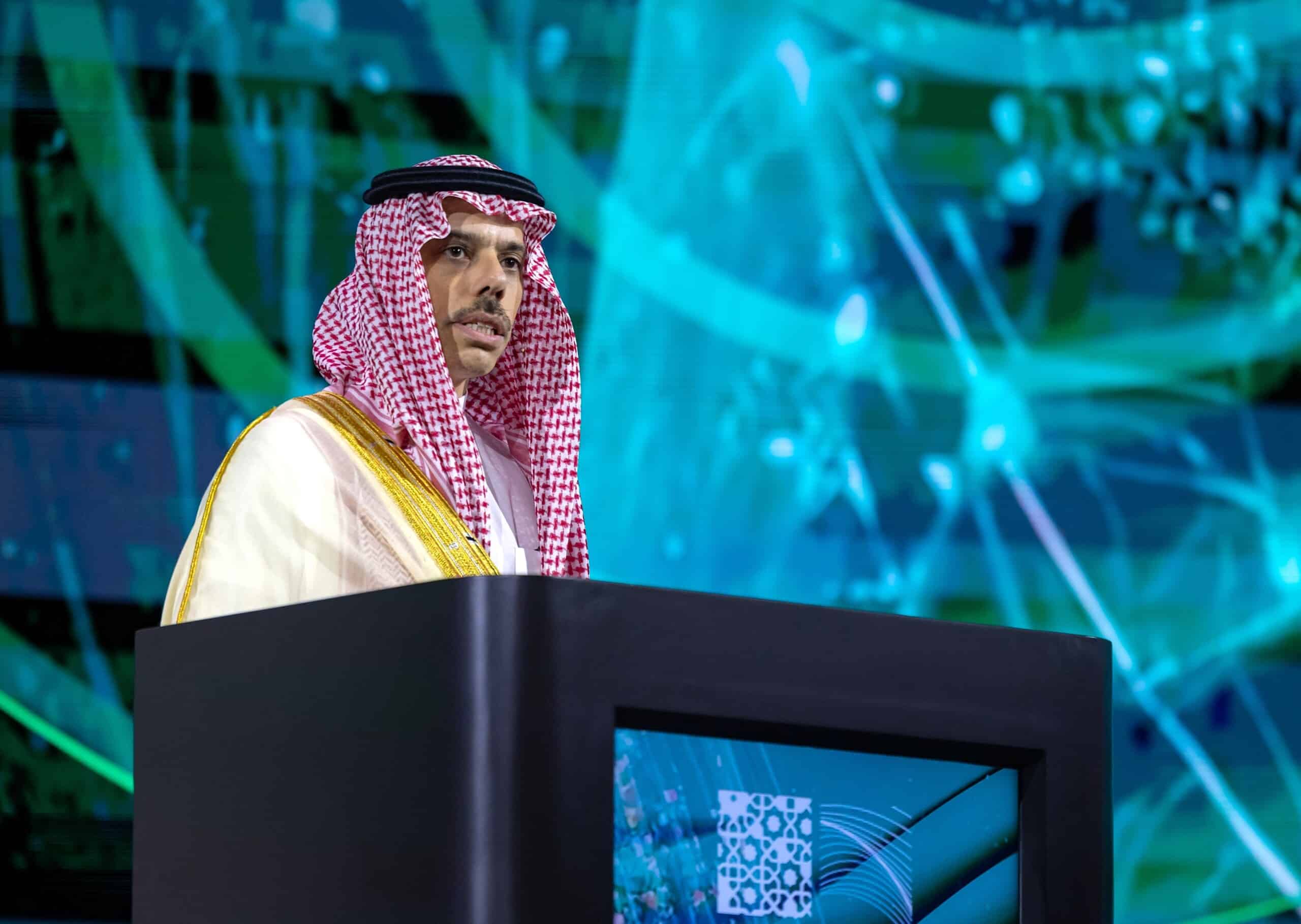
Anyone doubting China’s rapidly growing economic clout in the Middle East need only to have heard Saudi Arabia’s foreign minister speaking at a major business conference held in Riyadh last week.
“China is the biggest trade partner for Arab countries,” Prince Faisal bin Farhan Al-Saud told an audience of Saudi royals, corporate leaders and investors at the opening of the tenth Arab-China Business Conference on June 11. “Now, we have an opportunity to strengthen the historic Arab-Chinese friendship and work to build a common future towards a new era that will bring prosperity to our peoples.”
The florid rhetoric is being matched with a flurry of lucrative dealmaking. The two-day long summit alone saw some 30 new deals worth more than $10 billion announced between Chinese firms and Middle East investors — the largest, a whopping $5.6 billion investment from the Saudi government to create a joint venture with Human Horizons, a Shanghai-based electric vehicle startup.
…the U.S. is very reluctant to force countries into a binary situation where they have to choose one way or the other. The U.S. is fearful of pushing countries into China’s lap.
John Calabrese, a global studies professor at American University
Chinese firms in sectors like tech and pharmaceuticals are meanwhile finding markets open up to them in Arab countries as others have closed. Representatives from genomics firm BGI, intelligence company SenseTime, and telecoms giant Huawei — which have all been sanctioned in various forms by the U.S. government — presented at last week’s summit.
“Chinese firms are losing mature markets [like the U.S. and Europe]… So they can come into the Middle East, where countries are happy to do business,” says Jonathan Fulton, a nonresident senior fellow at the Atlantic Council. “And these companies are selling products that are really important for the development agendas of Middle Eastern countries.”

Closer business ties with Arab countries are underpinning what for Beijing has been an unusually high-profile diplomatic effort in the region. In March, China brokered a deal to normalize relations between Saudi Arabia and Iran; that came after Chinese leader Xi Jinping met with Saudi Arabia’s Crown Prince Mohammad bin Salman, on his first trip outside of China in two and a half years last December. Xi hosted Mahmoud Abbas, head of the Palestinian Authority, in Beijing on Wednesday, and offered to mediate peace talks between the Palestinian and Israeli authorities.
China’s economic and diplomatic initiatives are in turn posing questions for policymakers in the U.S. — long the dominant external force in a region where it has already fought two wars this century — about how to respond.
“The United States government has taken a much more vigilant and almost hostile attitude toward China’s growing involvement in the region,” says John Calabrese, a global studies professor at American University. “But the U.S. is very reluctant to force countries into a binary situation where they have to choose one way or the other. The U.S. is fearful of pushing countries into China’s lap.”
GETTING CLOSER
China’s economic links with the Middle East ramped up a decade ago, after Xi Jinping launched his signature the Belt and Road Initiative (BRI), which China’s government has used to invest $962 billion in infrastructure and other projects around the world, according to the Green Finance and Development Center at Fudan University in Shanghai. Since 2005, China has spent at least $273 billion on dozens of projects in the Middle East, becoming its biggest foreign investor in the process, according to the U.S. House of Representatives Foreign Affairs Committee. Virtually every country in the region has signed on to the program: In 2022, they collectively received 57 percent of all of China’s global BRI-related investments.
In Egypt, The Wall Street Journal reports that the China State Construction Engineering Corp Chinese struck a $15 billion deal to construct skyscrapers in President Abdel Fattah El-Sisi’s planned new capital city. In Iraq, the top BRI recipient in the world in 2021, the authorities have cooperated with China on numerous projects, including building a new, $5 billion oil power plant and more than 1,000 schools.
China’s desire to secure energy resources remains the bedrock of the Sino-Arab relationship. China’s imports from the Middle East almost doubled from roughly $150 billion to $270 billion in the decade from 2012; oil accounted for nearly half of all shipments from the region and North Africa to China in 2021 alone.
Over the same decade, though, China’s exports to the Middle East ballooned from $110 billion to more than $210 billion in 2022 — thanks largely to Chinese businesses finding common ground with Middle Eastern countries trying to diversify away from relying on fossil fuels.
“[Oil-dependent economies] have all launched digitization programs to transform their economies. They’ve got a lot of anxiety about the energy transition. It’s their future economic security at stake,” says Dale Aluf, research director at SIGNAL, a think tank focused on China-Middle East affairs. “They view China as an important partner in helping them to realize these things.”
Aluf has tracked about 450 public announcements of different types of engagements between Chinese tech firms and Middle Eastern countries, while the likes of Alibaba, Tencent, Baidu, and Bytedance have been active in the region for the past ten years. Huawei, in particular, has become “deeply entrenched” through helping build 5G networks in Saudi Arabia, the United Arab Emirates, Qatar and other regional countries, he says.
Middle Eastern countries are still reliant on U.S. technology, Aluf notes — in everything from iPhones to advanced weaponry. Still, in areas like infrastructure, Chinese companies typically offer cheaper prices, faster timelines, and less complicated terms to complete projects compared to counterparts from the U.S. or elsewhere. “In high-tech or in other harder infrastructure, Chinese companies come to the table being able to work on an entire project from start to finish… That can be extremely compelling,” says Robert Mogielnicki, a senior resident scholar at the Arab Gulf States Institute in Washington.
‘SEEING CHINA EVERYWHERE’
In the face of China’s push into the Middle East, U.S. diplomatic efforts appear to have made little headway. Secretary of State Antony Blinken visited Riyadh earlier this month touting potential cooperation on issues from clean energy to combating terrorism.

But if the visit was made in part to counter China’s influence, it had limited success. At a joint press conference with Blinken on June 8, Saudi Foreign Minister Faisal Al-Saud told reporters that his country’s “partnership with China has given us significant benefits… and our cooperation is likely to grow.”
Other American politicians have been blunter in attempting to convince countries to work with the U.S. instead of China. President Biden recently criticized China’s BRI as a “debt and confiscation” program.
But the U.S.’s problem is that its government and companies have to date failed to offer attractive alternatives to Chinese capital. The U.S. has approved billions of dollars for global infrastructure investments via various initiatives, including the U.S. International Development Finance Corporation (DFC), or the Partnership for Global Infrastructure and Investment (PGII) made up of G7 countries.
But none of those initiatives, even combined, match the scale of China’s BRI program. In 2022, the DFC spent a record $7.4 billion on global infrastructure investments while the White House recently announced it had “mobilized” $30 billion towards PGII by May this year. China, meanwhile, spent $67.8 billion on the BRI in 2022, taking its total BRI spending to $962 billion since establishing the initiative a decade ago.
Great power competition is giving countries more options. They can play these great powers against each other, which actually expands their strategic autonomy and freedom to maneuver.
Dale Aluf, research director at SIGNAL, a think-tank focused on China-Middle East affairs
“We don’t have an alternative to BRI,” congressman Gregory Meeks (D-NY) said at a Foreign Affairs Committee hearing this week. “Our budget pales in comparison to the amount of money China is spending on infrastructure.”
For sure, some caution against exaggerating China’s role in the Middle East.
“People in the D.C. bubble start to see China everywhere, even when it’s not something they should be thinking about,” says Fulton, the senior fellow at the Atlantic Council. “When folks in D.C. overestimate China’s role here, they miss the gains that they could be making in some pretty important sectors.”
And ultimately, countries in the Middle East and around the world may benefit from working with both the U.S. and China.
“Great power competition is giving countries more options,” says Aluf, from the think tank SIGNAL. “They can play these great powers against each other, which actually expands their strategic autonomy and freedom to maneuver.”

Grady McGregor is a staff writer for The Wire China based in Washington, D.C. He was previously a staff writer at Fortune Magazine in Hong Kong, writing features on business, tech, and all things related to China. Before that, he had stints as a journalist and editor in Jordan, Lebanon, and North Dakota. @GradyMcGregor




